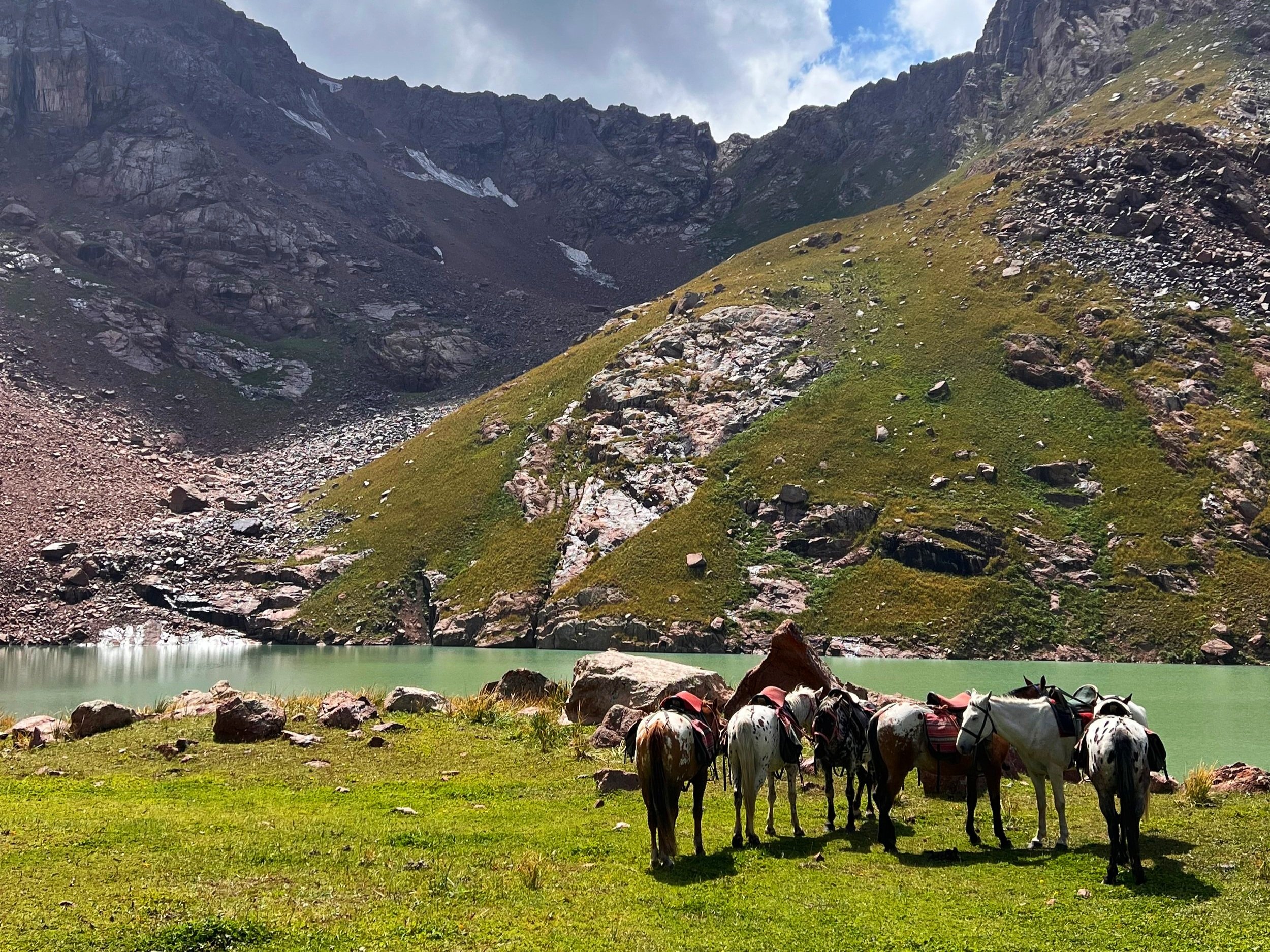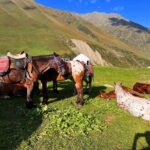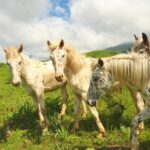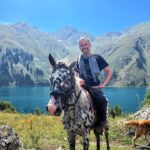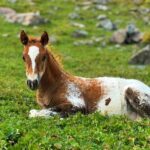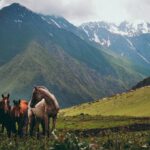
2025 Chaar Appaloosa & Kyrgyzstan Trip
Trip embarks May 6-16, 2025 in collaboration with the International Association Chaar Appaloosa.
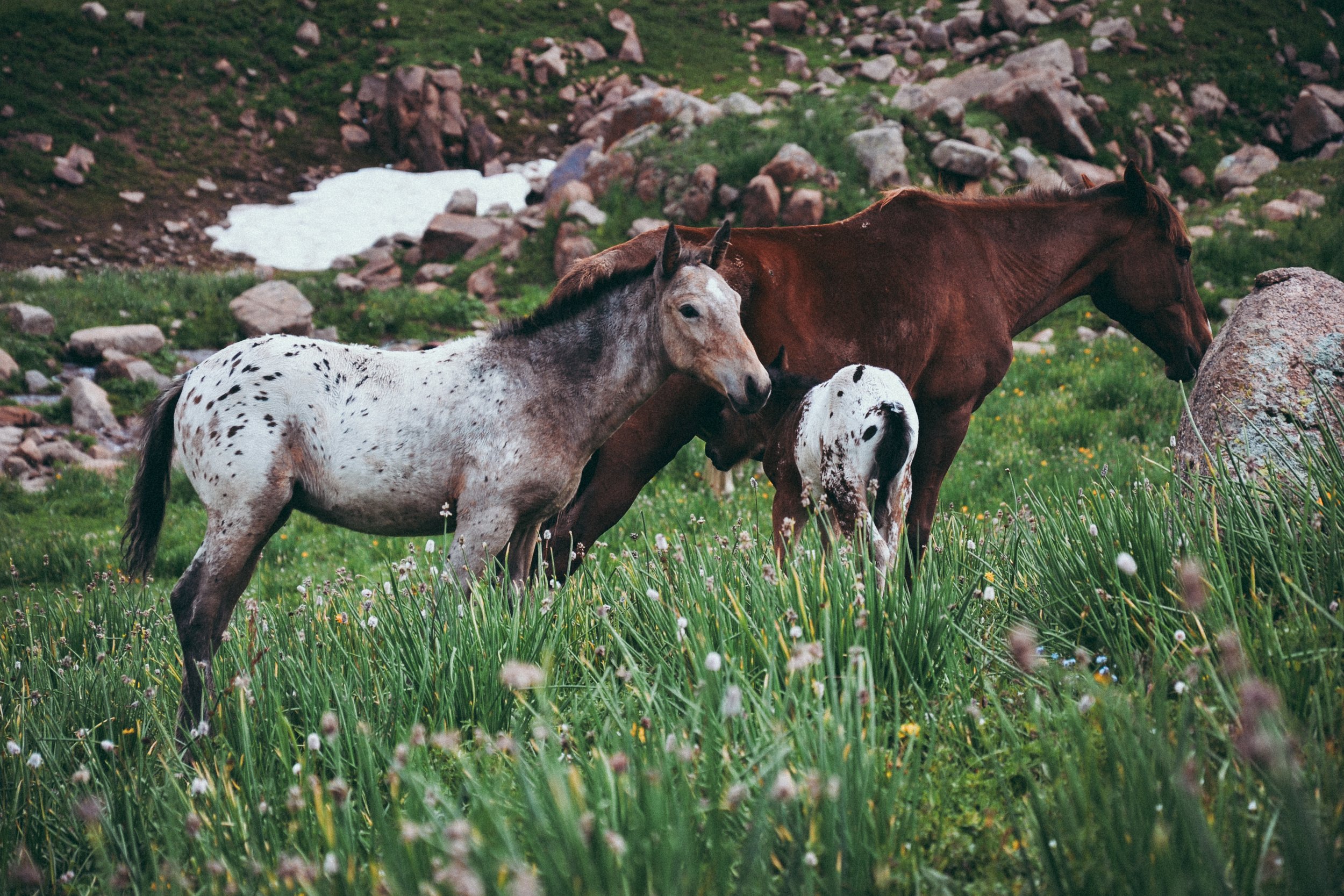
About the Chaar Appaloosa
The Chaar Appaloosa Horse is a rare heritage breed and a genetic ancestor to the modern Appaloosa. The breed is known for its spotted coat, calm temperament, natural stamina and resilience. The Chaar horses are an important part of Kyrgyz culture, used for transportation and herding, and featured in traditional folklore and ceremonies. On this trip you’ll learn first-hand how the International association Chaar Appaloosa is working to revitalize this endangered breed through careful breeding programs and conservation efforts which highlight the horses’ native economic, cultural, and agricultural importance, as well as sharing its value to global biodiversity.

Munarbek Kuldanbai
Meet Our Host & Guide: Munarbek Kuldanbai
Munarbek was born and grow up in small village Toktogul, located in Kyrgyz Republic and surrounded by celestial Tyan Shan mountains. Since his childhood he was fond of horses and equine culture. his first horse, he had when he was 10 years old, when his father presented him a young colt for his birthday.
Following his graduation from secondary school and after Kyrgyz National University, Munarbek ventured into the world of tourism, co-founding with his brothers the renowned “KirghizAsia” which organises riding, trekking, cultural tours around Kyrgyzstan and Central Asia. He also had his multifaceted role in the film industry that truly showcased his organizational abilities. As a fixer, director assistant, and co-producer for acclaimed films like “True Appaloosa”, “Echapees Belles”, “Vu Sur Terre” and for other films for CANAL +, FRANCE 5, CHANNEL 5 (Canada), BBC.
Munarbek’s deep connection to his homeland shone through those films, captivating audiences worldwide.
Yet, amidst his success in film and tourism, Munarbek’s heart remained steadfastly focused on the preservation of kyrgyz indigenous “CHAAR” horses. In 2012, he launched a groundbreaking initiative to revive these majestic creatures, blending traditional breeding methods with modern techniques. The formation of the “Chaar Appaloosa” international association followed, uniting enthusiasts worldwide in safeguarding kyrgyz equine heritage.
Beyond his work in film and tourism, Munarbek’s influence extended to the promotion of horseball in Kyrgyzstan. His visionary leadership as a president of Kyrgyz Horseball Federation led to the Kyrgyz horseball team’s participation in the Horseball World Cup which was held in France, Saint-Lo, a testament to his dedication and pioneering spirit.
In a bold move in 2021, Munarbek chose to fully devote himself to his passion project, leaving behind his business ventures. Today, he stands as a beacon of hope, conducting selection works, organizing events, conducting research, and tirelessly advocating for the preservation of Kyrgyzstan’s indigenous horses.
Meet Our Trip Coordinator: Yorke McGillivray
Owner of Arcana Akhal-Tekes and founder of Akhal-Teke International, Yorke is a passionate horsewoman turned conservation activist. Since a young age, she has been driven to understand endangered populations, whether they be rare breeds or species, and sought to find ways to help promote their preservation and appreciation. Yorke discovered the Chaar Appaloosa watching the documentary True Appaloosa with her mother, who shares her interest and excitement for rare horse breeds and genetics. Inspired by the film, Yorke was moved to find a way to help promote the Chaar in North America.
Early on in her involvement with the Chaar horse, Yorke helped facilitate continued genetic testing between Munarbek Kuldanbaev at the Kyrgyzstan Stud Farm and Dr. E. Gus Cothran at Texas A&M University’s Animal Genetics Lab. The results further confirmed the Chaar Appaloosa horse as the heritage breed for the American Appaloosa and validated their distinction as a genetically unique population in the region. Now she is an Ambassador of International Chaar Appaloosa horse Association and Chaar Horse from USA.
Yorke is currently on the Board of Directors for the Akhal-Teke Association of America (ATAA), an organization for another rare, ancient, nomadic breed for which she created an online pedigree database site. Yorke has also worked internationally with several nonprofit groups in projects focused on nature education and wildlife conservation.
She is a world traveler who loves to share the excitement of adventure and discovery with other travelers. Her aim in creating this trip opportunity is to help more people learn about and help promote the Chaar horse and their nomadic culture.
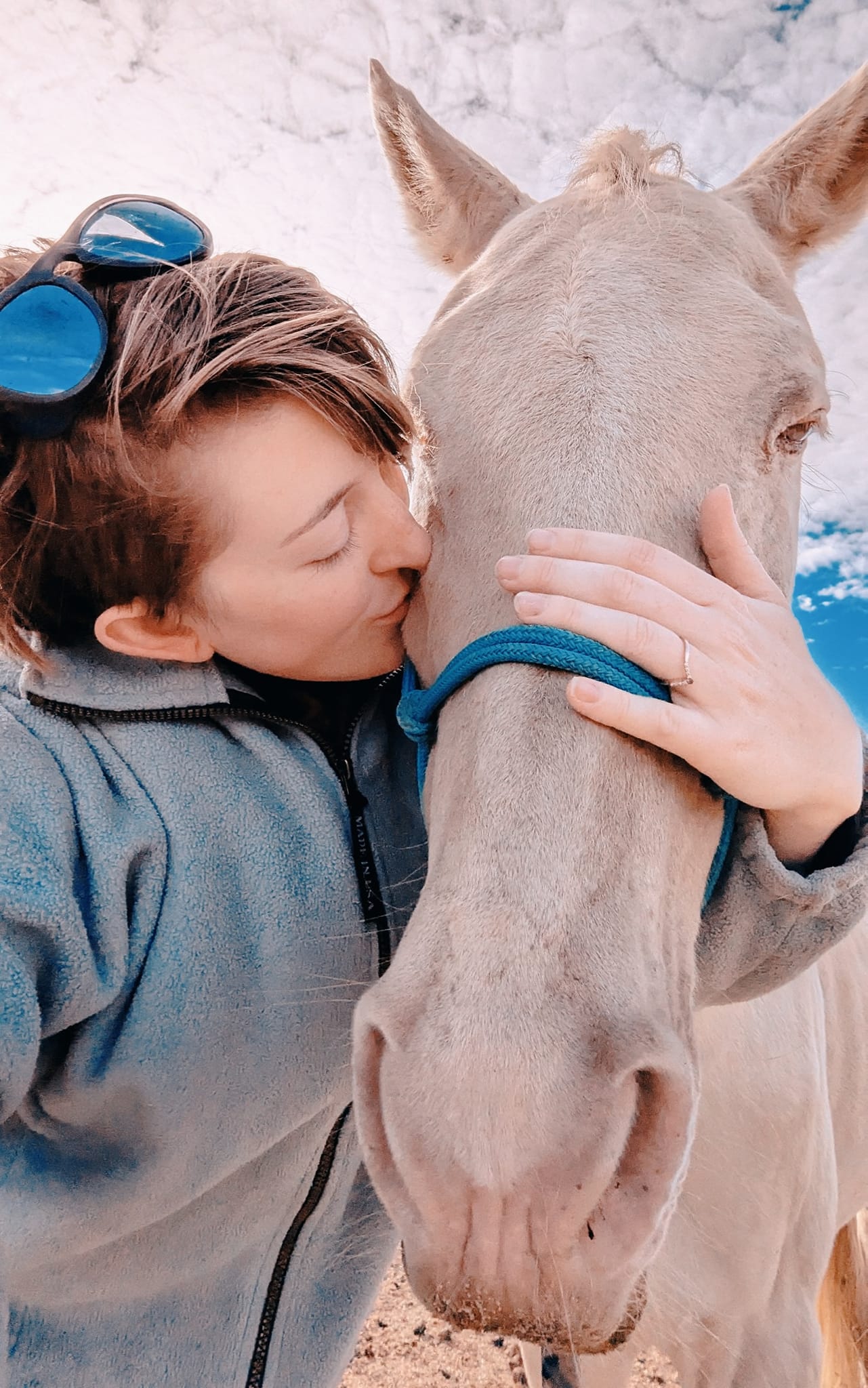
Yorke McGillivray
Itinerary
Day Zero
Arrival to airport. Transfer to hotel in Bishkek. Visit Bishkek and relax.
Day One
Transfer to Toktogul town (300km). Night at guesthouse.
Day Two
Visit Chaar Suluu farm and spend the day with Chaar horses. Night at the same guesthouse.
Day Three
Option to ride Chaar horses and picnic on mountains, or enjoy a free day. Night at the same guesthouse.
Day Four
Transfer to Arslan Bob walnut forest (300km) in Fergana valley where Alexander of Macedon on his conquest of Asia (329 BC) detoured through Ferghana specifically to secure these war horses prized for their courage, tough hooves and endurance.
Legend has it that Alexander the Great brought the walnut back to Europe from southern Kyrgyzstan in the 4th century B.C. when his army passed through the Arslanbob forest.
Night at guesthouse.
**This day includes some history connected to the Fergana or ancient Turkomen horses (now known as the modern Akhal-Teke).
Day Five
Visit forest and local village. Night at the same guesthouse.
Day Six
Transfer to Osh city (200km). On the road visiting old Uzgen town, which was one of the main trade point of Dayuan (heavenly horses) and was the first city defeated by Chinese invaders in the war for heavenly horses.
Night at guesthouse or hotel.
Day Seven
Visit Petroglyphs of Aravan
Heavenly Horses of the State of Dayuan. The Aravan colibine with a foal is vivid evidence of the existence of celestial horses of Fergana at the time of the origin of the Great Silk Road.
The ancient state of Dayuan was located in the Fergana Valley and is mentioned in Chinese records beginning from the 3rd century B.C.
Chinese sources tell about Dayuan as a developed state. Davan was famous for its horses, which they protected and hid from the neighbors. These were horses of a special breed of argamaks. The sources directly write: “Davan has good horses, they are in the town of Ershi, they are hidden, do not agree to give them to the Han envoy” [Künner, I, 1961, p. 122]. In order to get these high-bred horses, the Chinese emperor sends a special embassy with rich gifts to the capital of Dayuani. However, the Dayuani Council of Elders decided to refuse the Chinese, hoping that because of the long distance the Chinese army would not be able to reach their city. They called their horses “precious Dayuani horses.”
The Tang empire needed resources to fight the Huns, and horses were a key factor in victory – good horses. Two attempts to get these horses are known. The first attempt took the form of a diplomatic embassy to the capital of Dayuan, which ended with the assassination of the Tang ambassador. After that, a 60,000-strong army came to Dayuan. Eventually peace was made and the coveted horses were handed over to China.
The Aravan mare and foal is a rock carving situated on a 15 meter high rock above a mosque at Dul-Dul-At and looks like Akhal teke horse.
Night in hotel or guest house.
Day Eight
After breakfast, we head back to Toktogul. Transfer to hotel and visit market.
Day Nine
After breakfast, head back to Bishkek.
Day Ten
Transfer to airport. Departure.
Technical Information
Guides: English speaking Guide, horse guides
Transport: Minibus, car
Climate: The climate in Central Asia is continental with warm summer (30 to 42 ° C) and a cold winter (-10 to -25 ° C). At high altitudes, evening and morning temperatures drop (0 C).
What to Pack
1 small backpack for personal belongings for a day
– 1 bag with your luggage (only one per person) which will be transported when we travel by minibus
– 1 sleeping bag (0 C degree comfort) and inflatable mattress.
– Warm clothes, shorts and pants, cloak for the rain
– Mountain footwear, tennis shoes and summer open shoes
– Water bottle (1 litre)
– Protection against sun, bob hat, glasses, cream…
– Battery lamp
– Waist bag for papers, documents, and other personal items
– Personal pharmacy: blister prevention products, gastrointestinal medications, disinfectant, analgesic.
Essential: personal water purifiers for traveling. (The guide has a collective pharmacy for emergency care)
Note on the problems of health and pharmacy: It is the responsibility of each of you to warn the Chaar Appaloosa Association before the start of the tour about any medical problems (allergies, medical history, drug reactions, etc…). And to take, if necessary, drugs that are specific to you.
Costs
$1750 per person – price calculated on basis of the group of 10 person
**A non-refundable deposit of $500 will be required to secure your spot
Price includes:
-Organization and coordination of stay
-All accommodation and food during the stay (except drink alcohol)
-English speaking guide, horse guide(s)
-Transport for transfers and internal flight ticket
-fees for sightseeing and museums
It does not include:
– International air tickets
(**Current flight estimates for traveling from Denver, CO, USA to Bishkek, Kyrgyzstan for proposed trip is $1500-1800 round trip per person)
– Insurance and repatriation
– Soft, sports, and alcohol drinks
